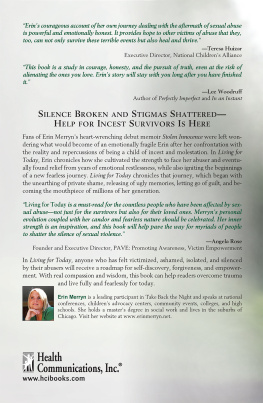Praise for
An Unimaginable Act
An Unimaginable Act is a wake-up call to society on a silent epidemic one brave confident woman refuses to stay silent about. Through the trauma and obstacles she has faced in her life, Erin takes readers on a remarkable journey of resilience, faith, courage, and forgiveness. She shares how she turned tragedy into triumph, which has led her on an unstoppable crusade to give children the voice she never had as a child through a very important law that will protect children for generations to come.
Actress Julianna Margulies
Erin Merryn: a fearless woman after Gods own heart. She has trail blazed the dark territory of child abuse and has brought a healing light to the hurting. Her crusade across America, to mandate child abuse prevention education, is etched on our minds; her spirit and fearlessness awakes and stirs the hearts of all who are touched by her compassion.
Michael Reagan
Erin Merryn is a dynamic Christian young lady who shares her tragic testimony of how she was abused growing up, but once she was able to open up, God set her free. She is one of the best speakers we have ever heard and her story will help millions.
Jim Bob and Michelle Duggar,
parents of TLCs 19 Kids and Counting
Erins Law gives our country the chance to ensure that the children of our nation have the information and tools necessary to recognize and report abuse. Children need to be informed about sexual abuse in a structured and safe environment, so that they know there are people who will help keep them safe. My support of Erins Law stems from my own familys history of sexual abuse and their lack of information on prevention and disclosure. I am proof that prevention is possible, and so I am grateful to Erin Merryn for taking the pain she experienced and turning it in to a national crusade to educate our youth.
Mallory Hagan, Miss America 2013
Erin embodies the type of courageous leadership needed to address todays social justice issuesnot only speaking out on behalf of children suffering abuse, but working to change the law in order to protect future generations for years to come. As a mother, I consider her a role model for my three daughters.
Kerry Kennedy
An Unimaginable Act
Overcoming and Preventing
Child Abuse Through Erins Law
Erin Merryn, M.S.W.

Health Communications, Inc.
Deerfield Beach, Florida
www.hcibooks.com
The Library of Congress Cataloging-in-Publication Data
Merryn, Erin.
An unimaginable act : overcoming and preventing child abuse through erins law /
Erin Merryn.
pages cm
ISBN-13: 978-0-7573-1756-9 (pbk.)
ISBN-10: 0-7573-1756-1 (pbk.)
ISBN-13: 978-0-7573-1757-6 (epub)
1. Merryn, Erin. 2. Child sexual abuse. 3. Incest. 4. Sex crimes. I. Title.
HV6570.M473 2013
362.76092dc23
[B]
2013037039
2013 Erin Merryn
All rights reserved. Printed in the United States of America. No part of this publication may be reproduced, stored in a retrieval system, or transmitted in any form or by any means, electronic, mechanical, photocopying, recording, or otherwise, without the written permission of the publisher.
HCI, its logos, and marks are trademarks of Health Communications, Inc.
Publisher: Health Communications, Inc.
3201 S.W. 15th Street
Deerfield Beach, FL 334428190
Cover image Meredith Jenks
Cover and interior design by Lawna Patterson Oldfield
Contents
O ur connection with the world is nothing less than a symphony of brain circuits activated by our senses. Organization of these brain circuits begins before birth and continues well into adulthood. When this organizational process is disrupted, a repair plan is automatically implemented, attempting to slowly reroute critical thinking abilities. Oftentimes, special cognitive testing performed by a psychologist is necessary to reveal clues to a past history of such injury-triggered brain reorganization. Many individuals possess brain networks that are currently compensating for damaged brain circuits. They and their families are also unaware that deep brain rewiring plans had once blossomed early in their lives to correct misfiring brain compartments.
Several years ago, I met an articulate, well-educated young woman who experienced a tonic-clonic seizure, once known as a grand-mal seizure, while driving. She described her story in an engaging and energetic manner, without omitting any details. She casually informed me, almost as if it were not a pertinent part of her story, that she had not had the ability to smell for as long as she could remember. Her neurological examination was completely normal, with the exception of an inability to appreciate odors. As a matter of routine, I ordered a simple electroencephalogram (EEG)a test where wires are temporarily glued to the scalp and attached to an electronic device that amplifies a difference in electricity between multiple regions of the head. This electricity arises from billions of brain cell connections that constantly generate seemingly random and very small amounts of electricity. These same brain connections are responsible for thought and insight. The EEG is a mapping device. It reveals signals from large groups of brain cells abnormally firing in unison, like a gospel choir bellowing out a refrain. Her test results were consistent with an abnormally functioning landscape in the left temporal lobe of the brain. I recommended a sensitive brain scan to visualize the lay of the land. Magnetic resonance imaging (MRI) mapped her brain geography. What surprised me most on her scan was the utter lack of a left temporal lobe. This area, which is supposed to be located directly behind each eyeball extending to the area of the ear, is about the size of a medium potato. The left temporal lobe is essential for short-term memory, which allows us to retain words, language, and the ability to write and speak. This region is also critical for smell and taste.
What impressed me most about this clinical encounter was the ability of this talented individual to write and publish well-received books and to speak eloquently, even while addressing large rooms of legislators. She is a true example of resilience.
I explained to Erin that she has temporal lobe epilepsy and should begin a low dose of antiepileptic medication. Upon beginning her medication, Erin actually gained a sense of smell for the first time from as far back as she could remember. A follow-up visit with her family revealed that she had experienced a severe body rash at birth. This rash was likely due to a virus called viral encephalitis, which spread to Erins brain and went undiagnosed and untreated. She demonstrated clear indicators of this in her delayed developmental milestones throughout early childhood. Erin struggled in grade school and high school. It was not until college that she stood out academically, earning honors and graduating from a masters program. Clearly, her brain reorganized to compensate for the complete loss of her left temporal lobe.
It is impressive that our brains possess a natural tendency to adapt to injury; however, approximately 500,000 people of the nearly 3 million in the United States afflicted with epilepsy lack the ability to reorganize dysfunctional brain regions and respond to medical treatment. Consequently, the recurring seizures that these individuals endure not only interfere with achieving ones long-term goals, but they often impede basic activities of daily living, thus fueling the stigma of epilepsy. Those with epilepsy can be met in every demographic, socioeconomic, and social class in our society. Education, advocacy, and research are the tools that offer knowledge, empowerment, and hope to those struggling to overcome this condition.
Next page







